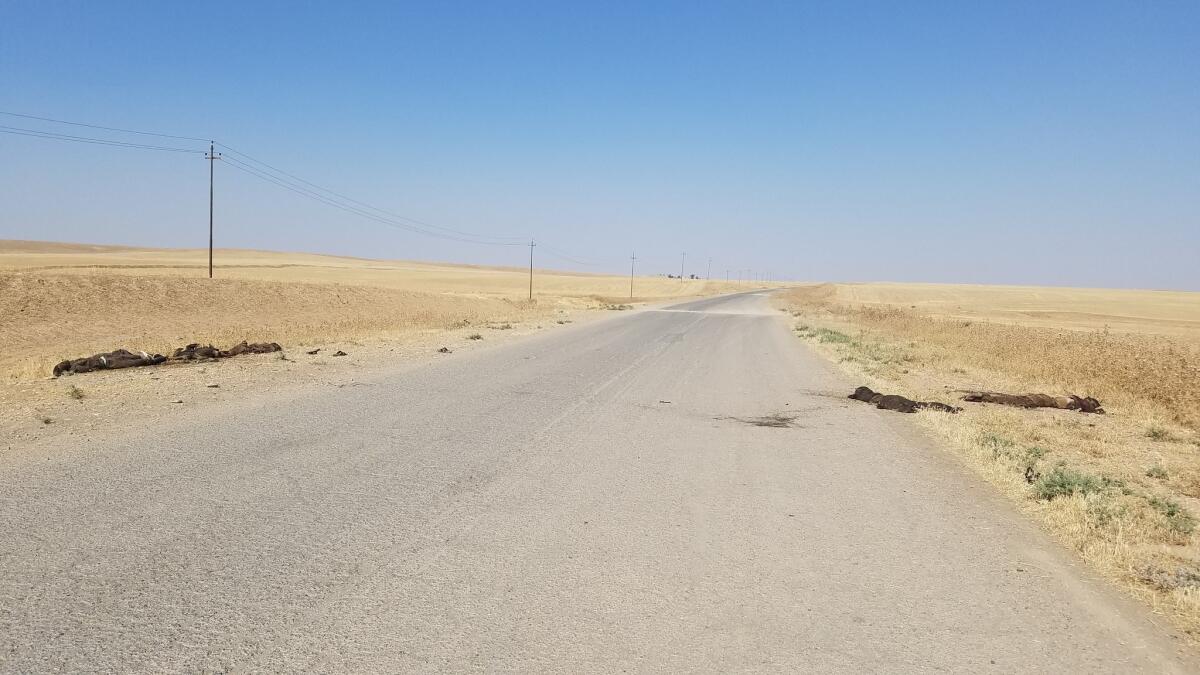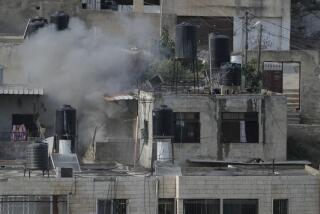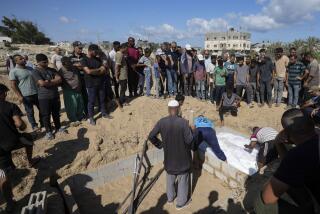Corpses being dumped in Iraq show signs of torture, execution — and Iraqi forces may be responsible

Reporting from Mosul, Iraq — The corpses had been tossed on both sides of a virtually deserted side road leaving the village of Hamam Alil, 15 miles south of Mosul. Shriveled and discolored by the summer sun, they barely registered a glance from drivers rumbling past.
But all seven corpses had three things in common: Their hands had been tied behind their backs; they had been blindfolded; and, though they were decomposed, one could still make out the rictus of pain imprinted on their faces.
The gruesome remains were among at least 26 blindfolded and handcuffed bodies found in government-held areas in and around Mosul, Human Rights Watch said in a report last week, in what it concluded were extrajudicial killings probably carried out by government forces since the start of the operation to retake the city from Islamic State in October.
As Iraqi forces, backed by a U.S.-led coalition, have advanced into Mosul’s neighborhoods, tens of thousands of desperate residents have fled the bloodshed. Once they reach government-controlled areas, those flagged for ties to Islamic State are held, often without charge, where they undergo further investigation before being presumably sent to trial or transferred to Baghdad.
In an earlier report, HRW said the Iraqi Interior Ministry was holding, without charge, at least 1,269 Islamic State prisoners in filthy, overcrowded prisons. Some were boys as young as 13.
But some, like the corpses found on the road, never got that far.
The lack of any apparent government action to investigate these deaths undermines the government’s statements on protecting detainee rights.
— Lama Fakih, deputy Middle East director for Human Rights Watch
Saed, a baby-faced tribal fighter manning a nearby checkpoint, remembered the night almost a month before when he and his fellow tribesman, Rayyan, had heard shots.
“We didn’t know what it was, and we radioed in to ask but got no response,” he said in an interview. He gave only his first name for reasons of security.
“In the morning we found the bodies,” he said.
It had been the second such incident in the area. A month earlier, four corpses, also bound and blindfolded, were found in a field a short distance from the road, said Talal Aqoub, the tribal leader in the nearby village of Boweyr.
“We don’t know who did it,” said Aqoub, adding that several villages along the same stretch of road had also become dumping grounds for bodies. “All the men who were killed had unkempt beards, the sort of ones you would see on the Dawaesh,” he said, using a nickname for Islamic State fighters.
Belkis Wille, Human Rights Watch’s Iraq researcher, said in a phone interview that several government agencies known to be screening and detaining people with Islamic State links are operating in the area.
“We have raised incidents like this with Baghdad, and they have said that, with such a huge amount of forces involved, surely there will be individual fighters who make mistakes, but that this was not policy,” Wille said.
But it’s not just state-affiliated groups that would take matters into their own hands.
Relatives of Islamic State members are often subject to tribal law. People who were harmed by the group exact thaer (a vendetta) against the militants’ family or tribe.
In the village of Kharaar, a few miles from where the corpses were found, several houses lie empty after having been scorched and then barricaded.
“No one is coming back to these houses, because they’re for people who were Daesh,” said Mohammad Hayess Sultan, the village’s mukhtar, or leader. “If they returned, there would be problems.”
Either way, with an active conflict zone only a few miles away, it’s unlikely the government would spare any resources for an investigation.
“Will [authorities] investigate specific incidents?” said Wille. “We’ve seen nothing to suggest they have a commitment to do that.”
The rights group had also received reports that a unit with the Popular Mobilization Forces, paramilitary units known as the Hashd al Shaabi, had executed 25 men and dumped their bodies in the Tigris River.
“The bodies of bound and blindfolded men are being found one after the other in and around Mosul and in the Tigris River, raising serious concerns about extrajudicial killings by government forces,” said Lama Fakih, deputy Middle East director for Human Rights Watch.
“The lack of any apparent government action to investigate these deaths undermines the government’s statements on protecting detainee rights,” she added.
The Human Rights Watch report comes after photographs emerged in the news media last month documenting mass torture believed to have been perpetrated by Iraqi forces. Detainees suffered the use of electric shock, choking with plastic bags and beatings, sometimes lethal.
Even in death, the abuse continues: Corpses of those suspected of Islamic State links are routinely treated with disrespect.
In the days after the bodies near Hamam Alil were discovered, “We couldn’t sleep outside from the smell,” said Saed, the tribal fighter. “But when we asked if we could bury the bodies, we were told not to interfere and that they should be left there.”
The public display of the bodies was “meant to serve as a warning to others,” said Wille.
During the Mosul offensive, corpses of slain Islamic State jihadists are often left to rot in the street, becoming the object of macabre selfies or desecrated by packs of dogs.
The abuses, said Nussaibah Younis, an Iraq expert at the London-based think tank Chatham House, risk making the reintegration of those living under Islamic State rule even more difficult once the jihadist group is defeated.
“Ultimately we’re going to face an ongoing ISIS insurgency even after the liberation of Iraq’s towns and cities and it will try to recruit disaffected Sunnis,” said Younis in a phone interview last week, using an acronym for Islamic State. She also noted that the government had to win the “hearts and minds” of the people in the area.
“Life has been so difficult for them under ISIS that this won’t be a challenge,” she said — so long as the army and Iraqi militias don’t commit atrocities that alienate them.
She added that the vast majority of Iraq’s security forces have behaved professionally, but the actions of a few would give “everybody a bad name and undermine the sacrifices” they have made.
ALSO
Battle begins for Islamic State’s last stronghold in Raqqah
A grim pattern in European attacks: Missed chances to pinpoint terrorism suspects beforehand
Bulos is a special correspondent.
twitter:@nabihbulos
More to Read
Sign up for Essential California
The most important California stories and recommendations in your inbox every morning.
You may occasionally receive promotional content from the Los Angeles Times.











